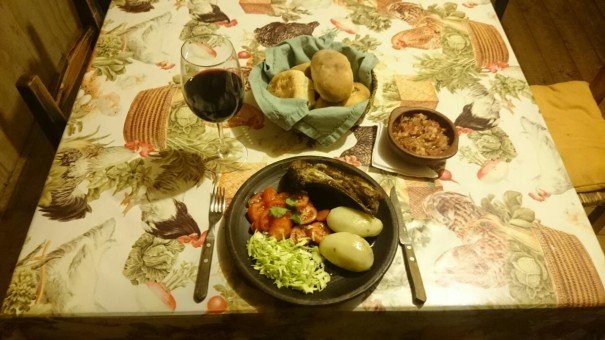
Sometimes You Just Want to Lay Down and Cover Your Body With Bread

Sometimes You Just Want to Lay Down and Cover Your Body With Bread
Cordero Asado on Chiloe
I arrive at the farm, located just outside Queilen on the grand island of Chiloe in southern Chile, sometime after noon. I say farm, but really it’s just where Pablo and Marcela live. They have sheep and pigs and chickens and a garden, but it’s not a farm in the traditional sense of the word.
The guests are already there. There’s Alejandro, an Argentinian living in Santiago who will consume several liters of wine throughout the day; another older man from Santiago who speaks excellent English; and a woman who might be French who after lunch will immediately flee to an adjacent bedroom to take a siesta.
The occasion is brunch.
The occasion is cordero asado.
Marcela shows me her “workshop,” which is actually a bakery. It smells so strongly of freshly-baked bread that I can’t breathe deeply enough to take it in, and want to curl up right there on the floor and take a nap, a piece of bread in my hand, a piece of bread in my mouth, my body covered in bread.
Outside, Pablo is spit-roasting a lamb that came from their flock. The flames dance and lick at the meat as Pablo slowly rotates it over the embers. And then there’s Clara, too. How could I forget Clara! Clara is Pablo’s mother. Later that night she grabs a cigarette from the cigarette drawer and heads to the porch, exclaiming, “Let’s get a little bit intoxicated.”
Clara might be the wisest woman I’ve ever met. She’s made a living her whole life doing drawings of fish and birds for biology journals. She shows me some of them: exquisite renditions of guppies and Magellanic Oystercatchers that leave me enchanted.
Brunch is a lively affair of Coke Zero and loud conversation. I eat about 16 bread rolls, each covered in more butter than the next, and my arteries start to groan. Alejandro has drunk a gallon and a half of wine but seems as lucid as a newborn baby. Marcela is a gracious hostess. The feast on the table abounds. There’s brussels sprouts and pebre (a kind of pico de gallo), fresh lettuce, new potatoes, old potatoes, native potatoes, and fresh bread, succulent bread, nourishing bread. And the lamb, of course. This feast is biblical. We are the apostles, though I’m not exactly sure what is the center of our adulation.
Later that day, after many convivial hours around the table, our voices dim in accordance with the dimming light of the evening. We have coffee and Camembert and also a kind of bread pudding. Doña Clara talks about growing up in France and then moving to Mexico and then back to Chile. I could listen to this woman talk all night. Everything she says is completely unselfconscious. She’s completely in the moment with her Coke Zero and mountain of lamb and after-dinner cigarette.
“I don’t eat vegetables,” she says.
That night I stand on the balcony of the cabin on the beach where I’m staying next to the main house, looking up at the stars. The Milky Way is throbbing. Despite general confusion and bombardment in my bowels I know I’ll sleep well tonight. I have to. I’m on a farm.